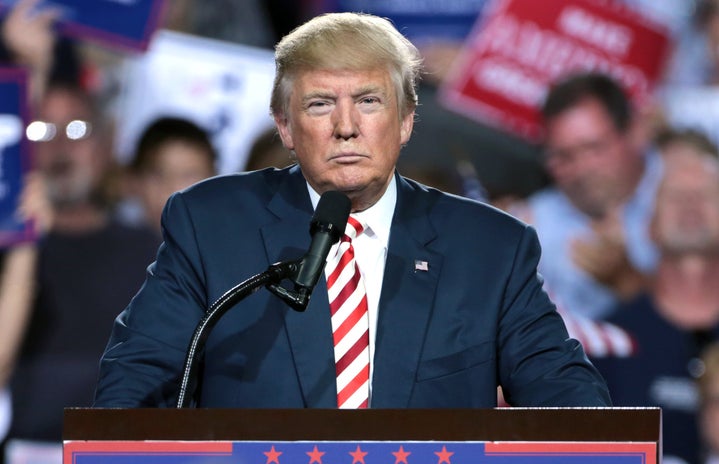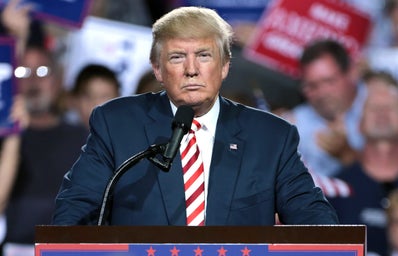When Donald Trump was finally ousted by Joe Biden in the 2020 U.S. presidential election, the world heaved a sigh of relief — but I did not. Don’t get me wrong, I was on everyone’s side, but somewhere deep down inside me, I knew that 2020 would not be the last we saw of the ex-president. And painfully, it seems that I was right.
Now, Donald Trump has some smart advisors whispering in his ears. He practically disappeared after his failed bid at overturning the election (remember that?), attempting to erase the unfortunate association he had with Rudy Giuliani’s hair dye and Four Seasons Total Landscaping. In leaving the constant tabloid coverage behind, he left the collective public conscious for a blissful few years. But unfortunately for many of us, he’s returned to fight another battle.
The dilemma he is now facing is one that was very predictable. To catch you up, I need to remind you of January 6th, and the insurrection of the Capitol. Trump, having lost in terms of electoral votes but having won the popular vote, called for his voters to reject Joe Biden as their new president. By riling them up and claiming that the election had been “stolen by emboldened radical-left Democrats”, he directly caused widespread protests across the country from many of his voters. Some stormed vote-counting facilities, others stormed the Capitol. This is where the problem lies.
Under the 14th Amendment, in Section 3, it is written that anyone who has “engaged in insurrection of rebellion” is banned from office. This constitutes a big problem for Trump, but it’s not as clear cut a prohibition for him as many people think. Was Donald Trump charged with conspiracy to defraud the U.S. and for inciting insurrection against the Capitol? Yes. Was he recently arrested on counts of fraud which gifted us with the absolutely stunning mugshot I now have framed in my room? Absolutely. Did he actually enter the Capitol during the riots and take part in the insurrection himself? No. And that’s what the Supreme Court will argue.
Maine and Colorado stripped Trump from the Republican Primary earlier this year — a move that has been appealed to the U.S. Supreme Court this week, where so far they’ve heard oral arguments for both sides. The decision should be clear, right? You do the crime, no more time in the oval office for you. But the problem for us is that the Supreme Court is not an apolitical body, and will err on Trump’s side. With a six-three conservative majority, the Supreme Court has and will continue to take Trump’s side, despite often being against the wishes of the public.
I thus use the title The Colorado Consequences not to refer to the U.S. Supreme Court’s likely decision to ignore the 14th Amendment, but instead to refer to what comes next. When the time comes that one of the six conservative judges passes away (hopefully not John Roberts, though, as he sometimes bridges no man’s land and sides with the liberals — probably not because because he has impartiality at heart, but more likely he just wants the Roberts Court to not only be known as the most conservative USSC in history), the Democrats now know what to do. In the past, in a very liberal let’s-keep-the-peace kind of way, a Democrat president would replace the deceased justice with someone with a similar political attitude and history of judicial decisions. Surprisingly, Republican presidents don’t take the same high road. For example, when Ruth Bader-Ginsburg passed away on 18th September 2020, Donald Trump nominated Amy Coney Barrett for the Supreme Court a week later. She had very little of the necessary experience, but because of the timing of Ginsburg’s death, Trump needed a nomination fast — and instead of replacing a very liberal Ginsburg with a liberal justice, he opted for a very conservative Barrett. He had the very late opportunity to swing the Court in his favour, and he took it. Meanwhile, Barack Obama was given the same situation at Justice Lord Toulson’s retirement in 2016, and opted to wait until the election was over to nominate a replacement, which was the precedent — handing Donald Trump’s later nomination of Neil Gorsuch to the new president on a silver platter.
I hope the consequences of this Supreme Court Case pushes the Democrats to realise the time and place for an impartial Court is long gone. When they get the oppourtunity to swing the Court in their favour, they must take it. For if they don’t, Trump’s legacy will continue to be felt for many decades to come.


